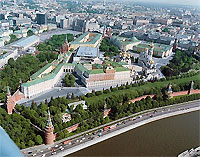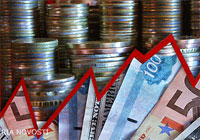Looking Forward
The Future Would Be Bright for the Russian Economy If Only the Kremlin Were Willing to Reform
Tai Adelaja - Russia Profile - russiaprofile.org - 4.17.12 - JRL 2012-71
As Russia's Prime Minister and President-elect Vladimir Putin prepares to reoccupy the Kremlin in May, the country's Economic Development Ministry has been forecasting nothing but a bright future. The global economy would face two major crises before 2030, either of which could lead to a long period of slow economic growth, said the ministry. The resulting global slowdown would lessen demand for Russian goods, particularly hydrocarbons, and that, in turn, would compel the government to cut down on social spending. However, a future global financial crisis could also make Russia stronger by providing the right incentives to reform the economy, the ministry said.

file photo The ministry suggested two possible scenarios for the country's economic development until 2030: the "innovation" or "best case scenario" and the "conservative scenario," where energy resources will play the main part in the economy. Under the best-case scenario, Russia's gross domestic product (GDP) is expected to grow at an average of 4.4 percent annually until 2030 far below the six to seven percent growth promised by Putin, Deputy Minister Andrei Klepach told journalists on Friday. In the so-called conservative scenario, which relies on Russia's energy and raw material potential, Russia's long-term economic growth will not exceed 3.5 to 3.6 percent per year. This compares with the ministry's own GDP growth estimate for 2012, which was reversed to 3.4 percent from 3.7 percent projected earlier. Last year, Russia's economy grew by 4.3 percent. "In either case, Russia expects to maintain a balanced budget, with the size of public debt not exceeding 20 to 25 percent of the GDP by 2030," Klepach said.

file photo A comparatively lower public debt will give the government a lot of room for budget maneuvering. "Spending on innovations will consume only 2.2 percent of the GDP or six percent of the total budget spending on average, and will increase to 2.8 percent of the GDP by 2030," Klepach said. Spending on the economy will increase to 7.1 percent of the GDP in 2030 from five percent in 2011. Education spending as a percentage of the GDP will grow from four percent last year to 5.3 percent in 2030, while health expenditures will climb from 3.9 percent in 2011 to 5.1 percent in 2030. However, defense spending will drop to 3.7 percent of the GDP in 2030 from about 5.5 percent last year, and so will social spending from 12.6 percent in 2011 to 11.4 percent in 2030.
The Russian economy will expand at a faster pace than the world economy under the best case scenario, with its share of global GDP reaching 37 percent in 2030, up from a mere three percent in 2010. Russia will increase its natural gas production from 670.5 billion cubic meters in 2011 to 900 billion cubic meters by 2030, while oil output is expected to remain at 510 million tons over the same period. The scenario also assumes that oil prices would remain at $105 per barrel from 2011 to 2015, rising gradually to $151 by 2030. Russia is also expected to leapfrog ahead of other European countries to close the gap in income per capita and the quality of life of its citizens. Per capita income is expected to increase from 48 percent of the euro zone level to about 95 percent in 2030, while the share of the middle class will rise from 22 percent in 2010 to around 48 percent in 2030.
But the principal risks ahead are lower oil and gas prices that could result from a decline in global demand. Oil and gas revenues would drop by half from 11 percent of the GDP in 2012 to 5.3 percent in 2030, according to the ministry's long-term forecast. However, the level of overall consolidated budget receipts is expected to dip only slightly, the ministry said. "Income projections into the budget system will remain relatively stable in the long term or more precisely they will decline slightly: from 38 percent of the GDP in 2012 to 37 percent of the GDP in 2020, and down to 35 or 36 percent of the GDP in 2030," Klepach said. Even such semi-stable growth potential might not compensate for the projected losses in oil and gas revenues, he said.
To achieve macroeconomic and structural policies set out in the optimistic scenario, the government hopes to expand the tax base and improve the system of current tax collection in addition to significantly changing the structure of government spending. The government also needs to roll back subsidies on public utilities such as gas and electricity and cut back on the number of state officials. The measures, which the government will consider on April 26, should enable the budget system to support the modernization of the economy, said the ministry. "Economic stability would be maintained by reducing the budget deficit level to 1.5 to two percent of the GDP by 2025," Klepach said. "But even those measures will not completely save the budget or significantly reduce the non-oil deficit."
Keywords: Russia, Economy - Russian News - Russia
As Russia's Prime Minister and President-elect Vladimir Putin prepares to reoccupy the Kremlin in May, the country's Economic Development Ministry has been forecasting nothing but a bright future. The global economy would face two major crises before 2030, either of which could lead to a long period of slow economic growth, said the ministry. The resulting global slowdown would lessen demand for Russian goods, particularly hydrocarbons, and that, in turn, would compel the government to cut down on social spending. However, a future global financial crisis could also make Russia stronger by providing the right incentives to reform the economy, the ministry said.

file photo The ministry suggested two possible scenarios for the country's economic development until 2030: the "innovation" or "best case scenario" and the "conservative scenario," where energy resources will play the main part in the economy. Under the best-case scenario, Russia's gross domestic product (GDP) is expected to grow at an average of 4.4 percent annually until 2030 far below the six to seven percent growth promised by Putin, Deputy Minister Andrei Klepach told journalists on Friday. In the so-called conservative scenario, which relies on Russia's energy and raw material potential, Russia's long-term economic growth will not exceed 3.5 to 3.6 percent per year. This compares with the ministry's own GDP growth estimate for 2012, which was reversed to 3.4 percent from 3.7 percent projected earlier. Last year, Russia's economy grew by 4.3 percent. "In either case, Russia expects to maintain a balanced budget, with the size of public debt not exceeding 20 to 25 percent of the GDP by 2030," Klepach said.
A comparatively lower public debt will give the government a lot of room for budget maneuvering. "Spending on innovations will consume only 2.2 percent of the GDP or six percent of the total budget spending on average, and will increase to 2.8 percent of the GDP by 2030," Klepach said. Spending on the economy will increase to 7.1 percent of the GDP in 2030 from five percent in 2011. Education spending as a percentage of the GDP will grow from four percent last year to 5.3 percent in 2030, while health expenditures will climb from 3.9 percent in 2011 to 5.1 percent in 2030. However, defense spending will drop to 3.7 percent of the GDP in 2030 from about 5.5 percent last year, and so will social spending from 12.6 percent in 2011 to 11.4 percent in 2030.

file photo The Russian economy will expand at a faster pace than the world economy under the best case scenario, with its share of global GDP reaching 37 percent in 2030, up from a mere three percent in 2010. Russia will increase its natural gas production from 670.5 billion cubic meters in 2011 to 900 billion cubic meters by 2030, while oil output is expected to remain at 510 million tons over the same period. The scenario also assumes that oil prices would remain at $105 per barrel from 2011 to 2015, rising gradually to $151 by 2030. Russia is also expected to leapfrog ahead of other European countries to close the gap in income per capita and the quality of life of its citizens. Per capita income is expected to increase from 48 percent of the euro zone level to about 95 percent in 2030, while the share of the middle class will rise from 22 percent in 2010 to around 48 percent in 2030.
But the principal risks ahead are lower oil and gas prices that could result from a decline in global demand. Oil and gas revenues would drop by half from 11 percent of the GDP in 2012 to 5.3 percent in 2030, according to the ministry's long-term forecast. However, the level of overall consolidated budget receipts is expected to dip only slightly, the ministry said. "Income projections into the budget system will remain relatively stable in the long term or more precisely they will decline slightly: from 38 percent of the GDP in 2012 to 37 percent of the GDP in 2020, and down to 35 or 36 percent of the GDP in 2030," Klepach said. Even such semi-stable growth potential might not compensate for the projected losses in oil and gas revenues, he said.
To achieve macroeconomic and structural policies set out in the optimistic scenario, the government hopes to expand the tax base and improve the system of current tax collection in addition to significantly changing the structure of government spending. The government also needs to roll back subsidies on public utilities such as gas and electricity and cut back on the number of state officials. The measures, which the government will consider on April 26, should enable the budget system to support the modernization of the economy, said the ministry. "Economic stability would be maintained by reducing the budget deficit level to 1.5 to two percent of the GDP by 2025," Klepach said. "But even those measures will not completely save the budget or significantly reduce the non-oil deficit."